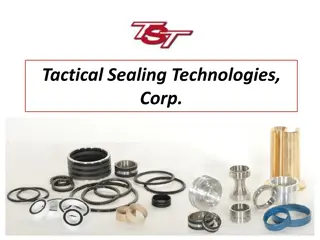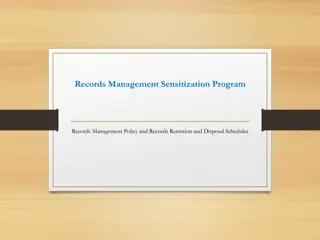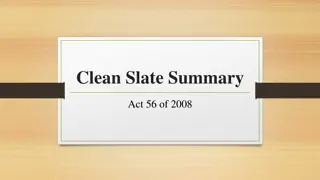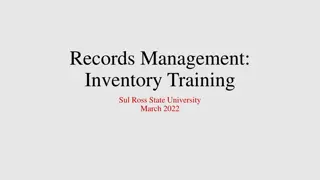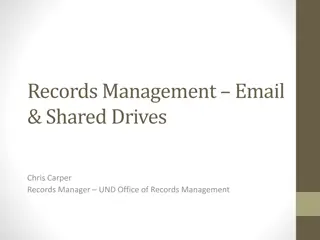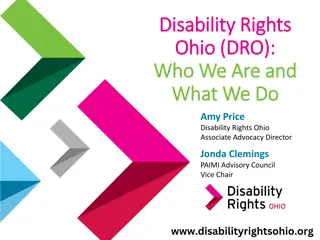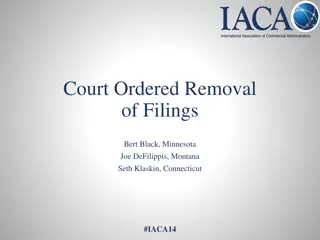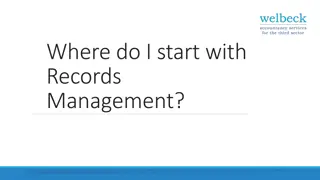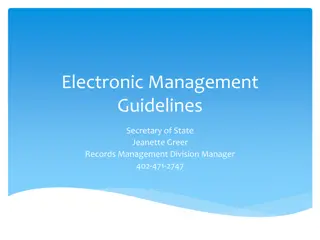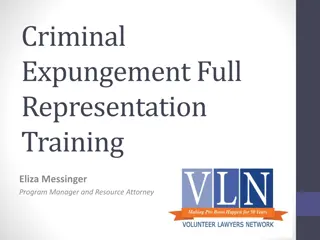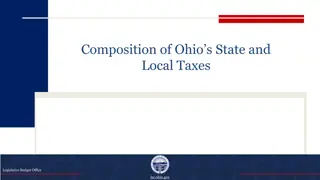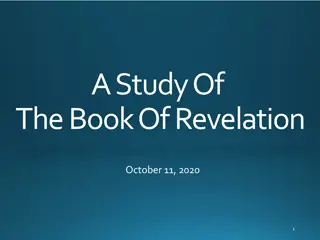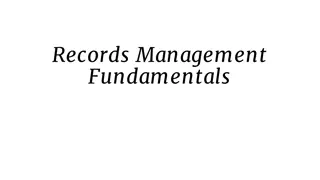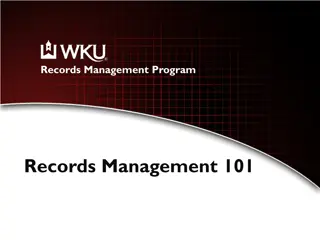Understanding Records Sealing and Expungement in Ohio
Records sealing and expungement in Ohio are processes that allow individuals to have their criminal records either sealed from public view or completely destroyed. These acts are privileges, not rights, and applicants must meet specific criteria to be eligible. Expungement involves the physical destruction of records, while sealing involves masking records from most entities. Recent legislative changes have expanded eligibility for sealing and expungement of misdemeanor convictions. Offenders must wait specific periods after conviction before applying for sealing or expungement, and a fee of up to $50 is required.
Download Presentation

Please find below an Image/Link to download the presentation.
The content on the website is provided AS IS for your information and personal use only. It may not be sold, licensed, or shared on other websites without obtaining consent from the author. Download presentation by click this link. If you encounter any issues during the download, it is possible that the publisher has removed the file from their server.
E N D
Presentation Transcript
Melanie R. Tobias Columbus City Attorney Zach Klein s Office mrtobias@columbus.gov 614-645-8876
Records sealing is an act of grace created by the state it is a privilege, not a right. Applicants must meet statutory criteria in order to be eligible for sealing of their record. Inherent authority of courts to seal records was very, very narrow and has now been replaced entirely by statutory framework. Pepper Pike v. Doe, 66 Ohio St.2d 374 (1981) unusual and exceptional circumstances
Expungement- The actual physical destruction of criminal records so that no one may access the records ever. Legally, it s as if the criminal case never happened. Records Sealing- The masking or sealing of criminal records from view of most entities in most circumstances. Records are not physically destroyed, legal reasons to access and use records allowed in certain circumstances. Expungement for years and years has been used as a colloquialism to mean records sealing.
SEALING EXPUNGEMENT SB 288 removed definition of eligible offender and instead court only looks at the convictions for which application is filed and whether the convictions are excluded from sealing or expungement R.C. 2953.32(A)(1)-(6) lists offenses ineligible for sealing or expungement Now most misdemeanor convictions are eligible for sealing/expungement except: D/V, VPO, victim less than 13 , Sexually Oriented Offense, Traffic convictions, multiple charges out of same act Any offense eligible for sealing may also be ordered expunged by court pursuant to SB 288 Used to only apply to human trafficking offenses and certain firearms offenses
Per RC 2953.32: Felony offenses of violence Sexually oriented offenses where offender is required to register as a sex offender prior to 2008 F-1, F-2 or more than 2 F-3 convictions
Offender must wait one year from conviction for misdemeanors and F-4/F-5, three years after F-3 conviction; Conviction end date is the end of probation/community control, post-release control, and full payment of any restitution or fines and costs ordered as part of sentence. Misdemeanor expungement wait time is same wait time as sealing, felony expungement wait time is 10 years after sealing eligibility MM wait time shortened to 6 months
Offender must apply to court for sealing or expungement. Applicant may request the sealing of more than one case in a single application. Applicant shall pay a fee of not more than $50, regardless of the number of cases the application requests to have sealed. Exception for fee allowed if applicant is indigent and files a poverty affidavit. 3/5ths of fee must be paid into state treasury, 2/5ths of fee goes to either county general revenue fund or municipal general revenue fund (state or city code conviction). R.C. 2953.32(C)(3)
No fee is required to be charged by court for the filing of the application. Offender must wait two years from grand jury no bill, no waiting period for application to seal a not guilty finding or dismissal of criminal complaint. Difference in waiting period is because a no bill likely to result in case being re-presented to grand jury with further investigation
R.C. 2953.32 provides that an applicant shall pay a fee of no more than $50, unless indigent. R.C. 2953.33 does not contain similar language silent as to any filing fees. R.C. 1901.26 sets costs to be charged in municipal court and allows the court to set fees and costs as necessary special funds County court s have similar authority to set fees and costs 1907.24 R.C. 1905.01(F) in keeping a docket, mayor s court shall be governed by laws pertaining to county court
State ex rel. Workman v. Miller, 2016-Ohio-1494 Local rules required $275 filing fee for sealing applications, when affidavit of indigence was filed, clerk only reduced amount of fee by $50, appeals court held that clerk must accept filing with no prepaid filing fee if affidavit of indigence filed. Court seemed skeptical of amount of costs being charged by the court for filing of application, but did not decide that issue.
Once application filed and appropriate fees paid, then case must be set for hearing within 90 days (new)- Prosecutor objection must be filed no later than 30 days before the hearing (new) Applicant and state entitled to a hearing in front of the court. MANDATORY Court must determine whether convictions are eligible for sealing, no longer looking at whether person is an eligible offender . There is no longer a limit on misdemeanor criminal convictions. R.C. 2953.31(A) Multiple convictions can be considered as one conviction in certain circumstances. Applicant cannot have any other pending criminal cases.
At hearing, court must weigh the interests of applicant against those of the government. If state filed an objection, court must consider the reasons given by the state in the objection. Court must consider any objection made in writing or orally by victim or victim s representative Even if state does NOT object, court must still weight the general interests of the government against those of the applicant.
H.B. 343, effective 4/6/23, provides that victim s rights notice requirement apply to records sealing and expungement cases Court must notify prosecution of hearing date not less than 60 days before the hearing Prosecution must then notify victim of hearing date for applications to seal/expunge convictions and notify victim of court s decision Does not apply to applications to seal dismissals/acquittals
Multiple appellate jurisdictions have held that a court cannot engage in the statutory requirement to weigh the parties interests without holding a hearing of some type. Thus, deciding that applicant s interests outweigh the government s or vice versa is an abuse of discretion. Applicant must put forward some specific reasons regarding their desire to have their record sealed simply filling out a form that indicates that they are statutorily eligible for sealing, by itself, is not enough for court to grant sealing.
R.C. 2953.61 Caused all kinds of confusion Amended by legislature Still some confusion Multiple charges, same case number Multiple charges, different case numbers Traffic offenses and criminal offenses Multiple charges, same case number and same dispo Some charges, though, not statutorily eligible for sealing
Court signs an entry ordering all official records of the case that pertain to the conviction sealed/expunged. Sealed records may be inspected by: Law enforcement or prosecutor to determine nature of future charges Parole or probation officer for use in supervising By applicant Law enforcement officer for use in a civil action arising out of conviction Prosecutor for determination of diversion eligibility Law enforcement background check for job at law enforcement agency BCI background checks in certain circumstances Sex offender registry School district/board of education
A governmental agency or office that maintains sealed records of convictions may maintain a manual or computerized index to the sealed records. The index shall contain only the name of, and alphanumerical identifiers that relate to, the persons who are the subject of the sealed record and the word sealed . The name of the crime committed shall not be included in the index. R.C. 2953.32(F)
If expungement is granted - records of conviction kept by any public office or agency must be destroyed, deleted or erased in a manner appropriate for the record s physical or electronic form so that the record is permanently irretrievable. R.C. 2953.28(A) Note dismissals and acquittals are NOT eligible for expungement, only convictions Only exception is human trafficking cases as provided for in RC 2953.521
No a governors pardon does not automatically require the sealing or expungement of the record of conviction. A person who receives a pardon must apply for records sealing pursuant to R.C. 2953.33. Clerk s office, upon receiving notice of pardon, must update the docket to reflect the fact of the pardon, but that s it- no automatic right to sealing or expungement. State v. Radcliff, 142 Ohio St.3d 78 (2015)
SB 288 creates a new statutory authority for prosecution to apply for sealing and expungement of low level controlled substance convictions (M-4 or MM only). Marijuana offenses essentially Same one year/6 month waiting period Only applies to convictions, not dismissals Same $50 fee, but court may waive that fee Court must set hearing within 90 days, notify prosecutor and prosecutor must then notify offender Offender can t have pending cases and court must determine that offender is rehabilitated
Not a records sealing, but if granted lifts the automatic bar of a collateral sanction stemming from a conviction. Useful for employment purposes for jobs that require licensing and certain convictions disqualify person from obtaining the necessary license. R.C. 2953.25 Application must be filed with division of parole (if conviction led to prison time) or common pleas court, if no prison term imposed. Indemnifies employer from civil suit if employer hires a person knowing they possess a CQE.




